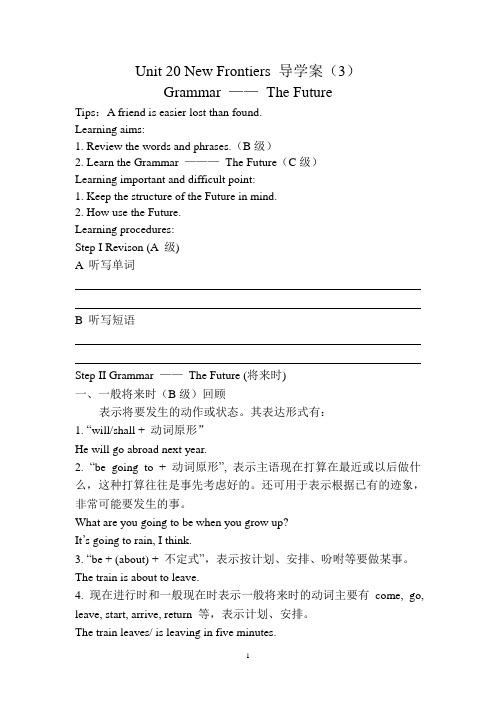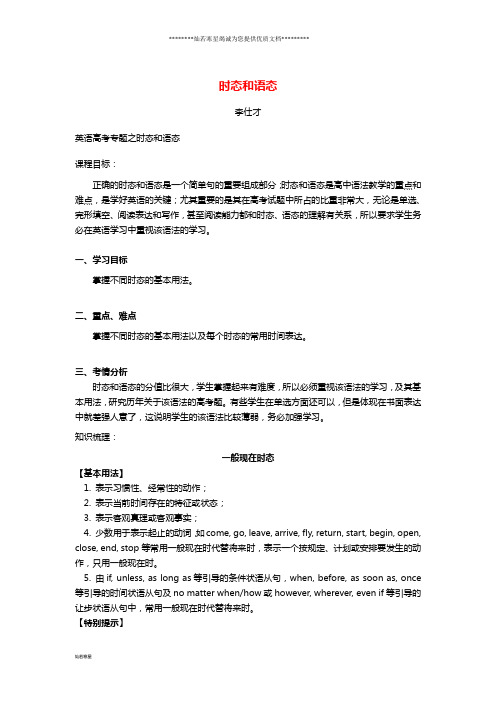高考英语将来进行时导学案
【学案】高中英语时态复习导学案

In-class learningPart 1 导学案Ⅰ高考题时间轴(根据所给时间状语填出正确的时态)1.(2009安徽)Daniel’s family _____________(enjoy) their holiday in Huangshan this time next week.2.(2010全国)--Have you finished reading Jane Eyre?--No, I _______________(do) my homework all day yesterday.3.(2011湖南)In the near future, scientists _____________(make) more advances in robot technology.4.(2012北京)George said that he ____________(come) to school to see me the next day, but he didn’t.5.(2013陕西)On Monday mornings it usually _______________(take) me an hour to drive to work although the actual distance is only 20 miles.6. (2014北京)I’m busy right now. I ________________(fill) in an application form for a new job.7.(2015全国)Until then his family ____________________(not hear) from him for four months.8.(2016福建)So far this year we ____________(see) a fall in house price by between 5 and 10 percent.9.(2017全国)Later, engineers _________________(manage) to construct railways ina tunnel system, which became known as the Tube.10.(2018全国)Since 2011,the country __________________ ( grow) more corn than rice.Ⅱ时态应用(补全对话)(Alice _____1_____(walk) in the street when she met Peter.)A: Hi, Peter! It ____2____(be) 2 months since I last saw you.P: I have just returned from Jiuzhaigou.A: Was it the first time you _____3____(be) there?P: Yes. And hardly ___4_____I arrived there when I_____5_____(strike) by its beauty.To tell the truth, it is the most beautiful place I _____6____(visit).A: But I heard a terrible earthquake hit Jiuzhaigou on 8th,Aug.P: Yes, very terrible. It was not until the police arrived that people _____7____(feel) safe.Fortunately, by the time I left Jiuzhaigou, everything _____8______(go) back to normal.A: You _____9_____(always help) others. Thumb up for you.P:I think that is my mission in life. It is high time that we ______10________(launch) a movement to raise money for rebuilding Jiuzhaigou.III 固定句型,固定时态Part 2 Post-class learning(跟踪案)Write a report using the grammars we learned today.要求:1 使用本堂课所学写作技巧. 2 词数100字左右Composition_____________________________________________________________________ _____________________________________________________________________ _____________________________________________________________________ _____________________________________________________________________ _____________________________________________________________________________________ _____________________________________________________________________ _____________________________________________________________________ _____________________________________________________________________ _____________________________________________________________________________________ _____________________________________________________________________ _____________________________________________________________________________ _____________________________________________________________________ _____________________________________________________________________ ____________Part 3 Homework(巩固案)1. Memorize all the sentence patterns.2.Finish and polish your composition.【答案与解析】I 1. will be enjoyingthis time next week是将来进行时的时间状语2.was doing all day yesterday昨天一整天是过去持续的动作,故用过去进行时3.will make In the near future在不久的将来,一般将来时4.would come相对于said而言,主句的动作将要发生,故用过去将来时5.Takes陈述一般事实6.am fillingright now是现在进行时的时间状语7.hadn’t hearduntil then指的是直到过去的某个时候,所以用过去完成时8.have seenso far是现在完成时的标志9.Managed陈述过去的事情10.has grown since句型中,主句用现在完成时II. 1.was walking 2.has been/ is 3.had been 4.had 5.was struck/stricken 6.have visited 7.felt 8. had gone 9.are always helping unched/should launch*当时正在做某事时,突然… … be doing…when……(引申)正打算做某事,这时突然...begoing to do ...when...… be about to do… when………be on the point of doing… when……*Sentence two自从做某事以来至今已经有多久了。
高考英语时态语态复习导学案

2012年长沙县实验中学高考复习专题英语时态与语态时态语态全知道:高考考什么?高考考到什么程度?高考怎样考?新课标与湖南高考说明对时态语态的能力目标与内容1、新课标八级语法能力目标A、进一步掌握描述时间、地点和方位的表达形式;B、进一步理解、掌握比较人、物体及事物的表达方式;C、使用适当的语言形式进行描述和表达观点、态度、情感等;D、学习、掌握基本语篇知识并根据特定目的有效组织信息。
2、湖南考试说明的语法高考范围掌握一般现在时、一般过去时、一般将来时、现在进行时、过去进行时、将来进行时、现在完成时、过去完成时、现在完成进行时、过去将来时。
掌握一般现在时、一般过去时、一般将来时、现在进行时、过去进行时以及现在完成时的被动语态3、近三年全国高考时态语态考察分析根据对2010年-2012年全国英语高考真题的研究,学生通过对下面表格的观察了解4、历届时态语态高考考查的角度1)考查固定句式中的时态和语态2)在上下文中考查时态和语态,即寻找句中时间状语,确定相应时态3)在语境中考查时态和语态:语境中的时态和语态具有灵活多变的特点,找出隐含于题干(上下文)中的时间信息,正确认定动作行为所发生的时间是解题的关键。
导学案(2课时)【学习目标】:1. To master the grammar rules about various tenses and voices.2.To be able to use them flexibly by cooperating actively.3.Be aborbed in your study with extreme passion and enjoy thepleasure of success.【使用说明】:本学案需1小时课前预习, 并进行自我检测。
【预习任务】:1. 完成自学内容, 用红色笔标出自已不能解决的问题, 准备课堂内交流。
2. 自学后完成材料后的练习,统计错题情况并制定课堂学习重点。
高考英语语法专题复习现在进行时表将来 课件

3.辨别用法Tips
现在进行时表示将来时通常与表示将来的时间状语 连用,否则容易与表示“现在” 或“现阶段”意义 的用法相混淆。
• Tom is coming here next week. • 汤姆下周要来这儿。 • I’m taking an exam in October. • 我将在10月份参加考试。
三、课堂练习
(四)单项选择 “系紧安全带”,可判断飞机将要起飞
dies and gentleman, please fasten your seat belts. The plane B .
A.take off B.is taking off C.has taken off D.took off
大多数动词用现在进行时表示一个最近按计划或安排要进行的 动作时都可用going to结构换用,但动词go和come用现在进行时 表示将来,不用于be going to结构中。
• I’m flying to London tomorrow. = I’m going to fly to London tomorrow. 明天我将飞往伦敦。
PART 04
家庭作业
四、Homework
造句:10个, 运用今日所学 (现在进行时 表将来句型)
超星学习通: 课后练习ຫໍສະໝຸດ 位移动词的进行时表将来-例句
• I'm going home tonight. • 我今晚回家。 • We're leaving for Changsha tomorrow. • 我们明天就去长沙。 • She is leaving tomorrow and you had better see her off. • 她明天就要离开了,你最好送她一下。
高考英语语法专题复习现在进行时表将来课件

表将来的现在进行时有时含有“决心”的意思,多用在否定结 构中。
• I'm not going. 我不走了。 • I'm not waiting any longer. 我不再等了。
D.will change
4. Professor Wang __C___ in our school till next Sunday .(2022上海卷)
A. will have stayed 下周周天,B. has stayed
表将来
C. is staying
D. stayed
三、课堂练习
(五)Group work:
3. Select a mobile phone for personal use is no easy task, because
technology is __A__ so rapidly.
现阶段发展速度迅速,用
现在进行时表将来
A.is changing
B.has changed
C.will have changed
1.Can you find the sentences of present continuous tense?
• I'm sitting here in a boring room. • I'm hanging around. I'm waiting for you. • I'm driving around in my car. • I'm wasting my time. I got nothing to do.
【推荐】高二英语选修7 Unit20 导学案(3)

Unit 20 New Frontiers 导学案(3)Grammar ——The FutureTips:A friend is easier lost than found.Learning aims:1. Review the words and phrases.(B级)2. Learn the Grammar ———The Future(C级)Learning important and difficult point:1. Keep the structure of the Future in mind.2. How use the Future.Learning procedures:Step I Revison (A 级)A 听写单词B 听写短语Step II Grammar ——The Future (将来时)一、一般将来时(B级)回顾表示将要发生的动作或状态。
其表达形式有:1. “will/shall + 动词原形”He will go abroad next year.2. “be going to + 动词原形”, 表示主语现在打算在最近或以后做什么,这种打算往往是事先考虑好的。
还可用于表示根据已有的迹象,非常可能要发生的事。
What are you going to be when you grow up?It’s going to rain, I think.3. “be + (about) + 不定式”,表示按计划、安排、吩咐等要做某事。
The train is about to leave.4. 现在进行时和一般现在时表示一般将来时的动词主要有come, go, leave, start, arrive, return 等,表示计划、安排。
The train leaves/ is leaving in five minutes.5. 在条件状语从句和时间状语从句中,常用一般现在时代替一般将来时。
高考英语时态和语态导学案

时态和语态李仕才英语高考专题之时态和语态课程目标:正确的时态和语态是一个简单句的重要组成部分;时态和语态是高中语法教学的重点和难点,是学好英语的关键;尤其重要的是其在高考试题中所占的比重非常大,无论是单选、完形填空、阅读表达和写作,甚至阅读能力都和时态、语态的理解有关系,所以要求学生务必在英语学习中重视该语法的学习。
一、学习目标掌握不同时态的基本用法。
二、重点、难点掌握不同时态的基本用法以及每个时态的常用时间表达。
三、考情分析时态和语态的分值比很大,学生掌握起来有难度,所以必须重视该语法的学习,及其基本用法,研究历年关于该语法的高考题。
有些学生在单选方面还可以,但是体现在书面表达中就差强人意了,这说明学生的该语法比较薄弱,务必加强学习。
知识梳理:一般现在时态【基本用法】1. 表示习惯性、经常性的动作;2. 表示当前时间存在的特征或状态;3. 表示客观真理或客观事实;4. 少数用于表示起止的动词,如come, go, leave, arrive, fly, return, start, begin, open, close, end, stop等常用一般现在时代替将来时,表示一个按规定、计划或安排要发生的动作,只用一般现在时。
5. 由if, unless, as long as等引导的条件状语从句,when, before, as soon as, once 等引导的时间状语从句及no matter when/how或however, wherever, even if等引导的让步状语从句中,常用一般现在时代替将来时。
【特别提示】特别注意主语是第三人称单数时谓语动词的变化。
【例句】The geography teacher told us the earth moves around the sun.地理老师告诉我们地球绕着太阳转。
If it is fine tomorrow, we shall visit the Great Wall.如果明天天晴,我们就去游览长城。
时态语态主谓一致导学案高三英语一轮复习
谓语动词的时态构成动词的时态和语态导学案一、重点时态梳理判断下列句子是否正确。
1.中式英语比比皆是I very like listen to music and every day I also will see some newspapers.( )I like listening to music very much and every day I read some newspapers as well. ( )I don’t know I should do what.( )I don’t know what I should do.( )2.句子没有谓语动词或一个句子中出现多个谓语The windows broken.( )The windows are (were) broken.( )Today, the largest number of people speak English may be in China.( )Today, the largest number of people who speak English may be in China.( )Today, the largest number of people speaking English may be in China.( )3.动词的时态、语态及系动词be的乱用Recently, the CCTV and some TVs began to take some measures.( )Recently, the CCTV and some TVs have begun to take some measures.( )She liked it very much and reads it to the class.( )She liked it very much and read it to the class.( )People were used to believe that the earth was flat.( )People used to believe that the earth was flat.( )Our village has taken place great changes.( )Great changes have been taken place in our village.( )Great changes have taken place in our village.( )[语法集训]题组一动词时态集训1.Jack _________ (work) in the lab when the power cut occurred.2.I _________ (read) half of the English novel, and I’ll try to finish it at the weekend.3.The book has been translated into thirty languages since it___________(e) on the market in 1973.4.This is the first time we _________ (see) a film in the cinema together as a family.5.It was raining lightly when I _________ (arrive) in Yangshuo just before dawn.6.I ________ (drive) down to London when I suddenly found that I was on the wrong road.7.Since 2011, the country _________ (grow) more corn than rice.st year, every employee in our pany _________ (offer) a physical examination free of charge.9.I _________ (walk) toward the door to go outside when suddenly Jim opened it unexpectedly.10.The Palace Museum has put on many attractions since it ________ (rebuild) in 2017.11.Rent usually ________ (go) up in the summer, when college graduates are moving out of their dormitories and seekingfor new places to move in.12.When I came back from my 10day holiday, I found the fish tank was broken and the fish ________ (die).13.Shakespeare’s play Hamlet ________ (make) into at least ten different films over the past years.14.—Were you surprised by the ending of the film?—No, I _______ (read) the book, so I already knew the story.15.Up to now, the program ________ (save) thousands of children who would otherwise have died.16.Leaving the less important things until tomorrow ________(be) often acceptable.17.Progress ________ (be) so far very good and we are sure that the work will be finished on time.18.If their marketing plans succeed,they ________ (increase) their sales by 20 percent.19.Judy is going to marry the sailor she ________ (meet) in Rome last year.20.I know a little bit about Italy as my wife and I ________ (go) there several years ago.21.Cathy didn’t go to the cinema with us last night, for she________ (do) her homework.22.The doctors ______ (refuse) to operate on Sam because his parents had not given permission.23.I found the lecture hard to follow because it _______ (start) when I arrived.24.—Hi, I’m Peter. Are you new here? I haven’t seen you around.—Hello, Peter. I’m Bob. I just ___________ (start) on Monday.25.The first time I saw Todd, he ______________ (talk) to some students at the English corner.题组二动词被动语态集训1.Throughout the history of moviemaking, Shakespeare’s plays __________________ (adapt) for films more than the works of any other writer.2. I feel it is your husband who is _________ (blame) for the spoiled child.3. If city noises _____________ (not keep) from increasing, people will have to shout to be heard even at dinner.4. The fifth generation puters, with artificial intelligence, __________________ (develop) and perfected now.5. I need one more stamp before my collection ____________ (plete).6. Rainforests ____________ (cut) and burned at such a speed that they will disappear from the earth in the near future.7. The new suspension bridge _________________ (design) by the end of last month.8. Tu Youyou is the first Chinese to win the Noble Prize in Medicine, she _________ (know) by more people nowadays.题组三综合集训(动词时态和语态专练)Science fiction ____________ (regard) by many people as a mirror through which our future can be freely imagined and explored. The ThreeBody Problem, written by Chinese writer Liu Cixin, ____ (be) one of those astonishing predictions about the future. The work ______________ (publish) first in a Chinese scifi magazine in 2006 and printed as a threevolume book in 2008. When the first volume was translated into English by ChineseAmerican author Ken Liu, it _________ (attract) attention around the world, being the first Asian winner of the Hugo Award for Best Novel. The book __________ (represent) many themes such as space exploration, alien contact, AI, and the future of humans.The ThreeBody Problem begins with the stories of two unrelated people, Ye Wenjie and Wang Miao. Ye ___________ (recruit) to join a secret project in a remote area of China, which ____________ (set) up to contact alien life forms. In the other story, set 20 years later, Wang Miao gets caught up in a popular online game called “Three Body”, in which people live on an unknown planet with three suns. But Wang discovers it is more than a game — it __________ (uncover) a great danger threatening human existence.Homework一、复习知识点,背记时态的谓语动词构成表格。
高一英语必修一导学案现在进行时表将来
学习目标:1.现在进行时表将来的用法2. 自主学习,合作探究;学会通过循环复习,牢固掌握基础知识的方法。
3. 激情投入,疯狂记忆,体验学习的快乐。
重点:牢记经常用进行时表将来的动词。
预习案学习建议:根据所列例句,理解并尝试总结现在进行时表将来的用法。
1(1)1) I’m leaving tomorrow. 我明天要离开。
2) Are you staying here till next week?你要在这儿待到下周吗?3)I’m going. 我就要走了。
4)We are leaving for Nanjing tomorrow. 我们明天就去南京。
(2)1)What are you doing next Sunday? 下星期天你打算干什么?2)My mother is buying mea bike soon. 我妈妈不久将给我买一辆自行车。
3)I’m meeting you after class. 课后我要找你。
2. When I grow up, I’m joining the army. 我长大了要参军。
3. (1) I’m not going there. 我不去那儿。
(2)I’m not waiting for him any longer. 我不再等他了。
预习自测:学习建议:根据所列例句,理解并尝试总结现在进行时表将来的用法。
1(1)1) I’m leaving tomorrow. 我明天要离开。
2) Are you staying here till next week?你要在这儿待到下周吗?3)I’m going. 我就要走了。
4)We are leaving for Nanjing tomorrow. 我们明天就去南京。
(2)1)What are you doing next Sunday? 下星期天你打算干什么?2)My mother is buying mea bike soon. 我妈妈不久将给我买一辆自行车。
高考英语时态和语态复习学案
高考英语时态和语态复习一.时态和语态的主要考点1、考查在语境中判断动词时态的运用能力。
常考的时态为:一般现在时、现在进行时、现在完成时、现在完成进行时、一般将来时、将来进行时,将来完成时一般过去时、过去进行时、过去完成时、过去将来时等。
2、时间、条件、让步等状语从句中动词的时态;主从句时态呼应问题。
3、延续性动词和终止性动词的用法区别。
4、只有及物动词才有被动语态。
5、某些以主动形式表被动意义的动词的用法。
一.一般现在时( The Present Indefinite )Fill in the blanks.I _____ (study) hard abroad every day and I _____ (get) along well with my roommates, but sometimes I _____ (miss) my families.1)表经常性、习惯性的动作或状态,常与表示频率的时间状语连用,如always, often/ usually/frequently, sometimes, every…, at …,on Sundays/….Correct the sentence.The geography teacher told us that the earth moved around the sun. _______2)表客观事实、普遍真理。
The shop will close at 9:00 p.m. _____3) 表示按计划、规定,时间表将要发生的动作或存在的状态, 一般用于, come, go, start, begin, leave, arrive, return等位移/终止性动词,常与时间状语连用.The train leaves at 6 tomorrow morning.When does the bus start? It starts in 2 minutes.一般现在时的典型例句Professor Williams keeps telling his students that the future belongs to the welleducated.If it rains tomorrow, I won’t go there.3. Remember to send me a photo of us next time you write to me.注意一些特殊的连词until, as soon as , the moment, immediately ; as long as ,unless…4. There comes the bus.汽车来了There goes the bell.铃响了二.现在进行时(The Present Continuous Tense)1)表示现在这个时刻( 指说话时)正在发生的事情。
将来进行时复习课件-2023届高三英语复习
计划、进行 意愿、许诺
Tell the differences.
• When will you see Mr. White? • When will you be seeing Mr. White? • Mary won’t work in this factory. • Mary won’t be working in this factory.
• In the not-too-distant future, we will live in smart homes that will lock the door for us when we are away and remember to switch off the TV when we forget.
• In the not-too-distant future, we will live in smart homes that will lock the door for us when we are away and remember to switch off the TV when we forget.
1. 将来进行时通常用于表示最近或较远的将来正 在进行的动作(搭配延续性动词)。 (to say something that will be happening in the near future or in the distant future)
The Future Progressive Tense将来进行时
because I will be playing soccer then.
2. 将来进行时通常用于将来某一时间正在进行的动 作,往往是已经计划好的。 (to say something that will be happening at a specific time in the future, usually as scheduled )
- 1、下载文档前请自行甄别文档内容的完整性,平台不提供额外的编辑、内容补充、找答案等附加服务。
- 2、"仅部分预览"的文档,不可在线预览部分如存在完整性等问题,可反馈申请退款(可完整预览的文档不适用该条件!)。
- 3、如文档侵犯您的权益,请联系客服反馈,我们会尽快为您处理(人工客服工作时间:9:00-18:30)。
将来进行时李仕才高考专题--将来进行时课程目标:一、学习目标1. 将来进行时的基本用法。
2. 祈使句的用法。
二、重点、难点重点:将来进行时的基本用法。
难点:将来进行时和现在进行时及一般将来时的区别。
三、考情分析这两种语法在考试题中所占分值不太多,但是这两种语法会和其他语法混合起来考查;将来进行时会和现在进行时及一般将来时混合考查;祈使句会和非谓语动词混合考查。
知识梳理:一、将来进行时态【教材原句】Where will we be living in twenty year’s time?二十年后我们将在哪里生活?We won’t be living underground or in space.我们不能生活在地下或太空。
We will be living in houses and flats just as we do today.我们就像今天一样生活在房子和楼里面。
【用法1】1. 定义:表示将来某时进行的状态或动作,或预测将来会发生的事情。
2. 常用的时间短语:soon, tomorrow, this evening, by this time, in two days, tomorrow evening .3. 结构:主语+will/shall be +doing【例句】I’ll be meeting him sometime in the future.在将来的某个时间我会见到他。
I will be studying in unive rsity at the age of 20.我20岁的时候将会在大学里学习。
【考题链接】完成句子①下星期的这个时候,我们将在那个工厂劳动。
This time next week we in that factory.②明天下午三点,我们将正在开会。
We a meeting at three o’clock tomorrow afternoon.答案:①shall be working ②will be having【用法2】使用将来进行时态的几种情况1. 用来表示在将来的某一个时间正在进行的动作或按计划、安排、决定或预料将要发生的事。
【例句】When will you be seeing Mr. White?你将什么时候见怀特先生?2. 将来进行时主要表示将来某一时刻正在进行的动作,或表示要在将来某一时刻开始,并继续下去的动作。
【例句】The students will be watching TV at seven this evening.今天晚上七点,学生们将正在看电视。
3. 将来进行时用来表示不含意图又未发生的动作。
【例句】I will be helping Mary tomorrow.明天我帮玛丽干活。
(这不表示说话人已安排好要帮助玛丽或者想帮助她)【考题链接】1. —What will you do tomorrow evening?—I _______my favorite program between 8 and 11, then I will go out to drink in the bar.A. will watchB. am about to watchC. will be watchingD. am watching答案:C解题思路:句意为:—明天晚上你要做什么?—在明天晚上的8点到11点钟,我会看我特别喜欢的节目,然后我去酒吧喝酒。
根据句意知,动作发生在明天晚上的8点至11点之间,符合将来进行时态的定义,发生在将来的具体时间的动作用将来进行时。
2. He _______ a dark green suit and a yellow tie waiting for you at nine o’clock tomorrow morning.A. is wearingB. will wearC. wearsD. will be wearing答案:D解题思路:句意为:明天上午的9点钟他会穿着一套深绿色衣服并戴一条黄领带等着你。
表示的是将来的某一时刻正在进行的动作,故用将来进行时态。
【用法3】与现在进行时态表示将来的区别现在进行时表示一种经过考虑的,将来要进行的动作,而将来进行时通常表示正常过程中会发生的动作,因此将来进行时不如现在进行时那样肯定,比后者的偶然性要大一些。
【例句】I am seeing Tom tomorrow. 明天我要和汤姆见面。
I’ll be seeing Tom tomorrow. 明天我会见到汤姆。
【考题链接】1. I’m afraid I won’t be available then. I ___ a friend off at two o’clock this afternoon.A. seeB. sawC. will seeD. will be seeing答案:D解题思路:句意为:恐怕那时我没空。
下午两点钟我会去送一个朋友。
表示发生在将来某一时刻正在进行的动作。
2. What do you think you _______ at this time next year?A. will doB. will be doingC. are going to doD. do答案:B解题思路:句意为:你认为明年这个时候你会在做什么?谓语动词发生在将来的一个具体时间,故用将来进行时态。
即学即练:1. At this time tomorrow ______ over the Pacific Ocean.A. we’re going to flyB.we’re to flyC. we’ll flyD. we’ll be flying答案:D解题思路:句意为:明天这个时间我们会飞过太平洋。
表示将来的某个时间会发生的一个动作;而C是一般将来时态,表示肯定,及一种意图。
2. Daniel’s family ______ their holiday in Huangshan this time next week.A. are enjoyingB. are to enjoyC. will enjoyD. will be enjoying答案:D解题思路:句意为:丹尼尔一家下周这个时间会去黄山度假。
一般将来时态指的是一个计划,一个安排;而将来进行时态指的是将来通常会做的一个动作;且句中this time next week是将来的一个具体时间,故选D。
3. If you plant watermelon seeds in the spring, you ______ fresh watermelon in the fall.A. eatB. would eatC. have eatenD. will be eating答案:D解题思路:句意为:如果你春天种上西瓜种子,秋季你就会吃到新鲜的西瓜了。
将来进行时通常表示的是对将来事实的简单陈述,未经过深思熟虑;故选D。
4. —Guess what ,we’ve got our visas for a short —term visit to the UK this summer.— How nice! you ______ a different culture then.A. will be experiencingB. have experiencedC. have been experiencingD. will have experienced答案:A解题思路:。
句意为:—告诉你一个好消息,我们得到了今年暑假去英国短期度假的签证。
—好极了!你们那时会感受到不同的文化。
将来进行时主要表示将来某一时刻正在进行的动作,或表示要在将来某一时刻开始,并继续下去的动作。
故选A。
二、祈使句【基本用法】意义:祈使句表示请求、命令、建议等。
形式:谓语动词一律用原形。
句子中通常不用主语,句末用惊叹号或者句号,用降调。
否定句:Don’t +动词原形或Never+动词原形【例句】Stand up, please!起来!Don’t smoke!不要吸烟!【用法1】祈使句的反意疑问句结构否定祈使句+ will you; 肯定祈使句+ will/won’ you.特别提示:Let’s包括对方, Let us不包括对方。
反意疑问句时最明显。
Let’s go, shall we?咱们去吧,怎么样?Let us go, will you?让我们去吧,行吗?【例句】Let’s take a rest, shall we?咱们休息一会儿,好吗?(表示提议,包括对方在内)Let us take a rest, will you?(你)让我们休息一会儿,好吗?(表示请求,不包括对方在内)Don’t talk aloud in class, will you?课堂上不要大声说话,好吗?如果陈述句的祈使句是否定形式,反意疑问句只能用will you。
【考题链接】1. Let’s go out for a walk, ________?A. shall weB. shall youC. will youD. won’t you答案:A解题思路:考查祈使句的反意疑问句。
句意为:让我们去散步,好吗?表示请求,不包括对方在内,应用shall we。
2. When you’ve finished with that book, don’t forget to put it back on the shelf, ?A. do youB. don’t youC. will youD. won’t you答案:C解题思路:考查祈使句的反意疑问句。
句意为:你读完那本书,不要忘了再放回书架,好吗?如果陈述句的祈使句是否定形式,反意疑问句只能用will you。
【用法2】带主语的祈使句1)有时为了强调向谁提出要求、发出命令或分配任务,第二人称主语也可以表示出来,祈使句的前后还可以有呼唤语,这时主语须重读。
【例句】Boys,you carry wate r. Girls,you clean the windows.男生们,你们提水;女生们,你们擦窗子。
Tom, behave yourself.汤姆,规矩点。
2)祈使句的主语除了用you外,还可用第三人称,比如:everybody, everyone, somebody 等。
【例句】Everybody stand up! 大家都站起来!Jack stand over there. 杰克站到那边去。
3)无动词祈使句。
有时祈使句仅使用一个名词短语来充当。
【例句】This way, please! 请这边走。
Faster! 再快点。
